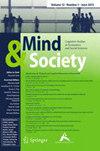Loneliness, Resilience and Distress of Indian adults during COVID-19 : Age-dependent Gender Differences
Q1 Arts and Humanities
引用次数: 0
Abstract
On March 24, 2020, a nationwide lockdown was implemented on the 138 million-strong population of India as a preventive measure against the COVID-19 Pandemic. Such global social isolation and fear of uncertainty are capable of producing psychological adversities, challenging people’s ability to adapt to a new way of life. This study examines gender differences in loneliness, resilience, and distress among different age groups (students: 17–22, young: 23–40, middle: 41–60) as there is a lack of research that explores how disproportionately the pandemic affects each gender. In the midst of the lockdown, an online survey on loneliness, resilience, and distress was conducted on the adult Indian population. A total of 243 responses were collected and analyzed. The findings revealed that 51% of the population was already lonely, and a significant number of people were distressed, particularly among students (F (2,243) = 4.78, p =.004).Males (M = 8.09) were significantly more distressed than females (M = 4.93) in the middle-aged population (F (1,59) = 8.08, p =.006).Even though no significant gender differences were found in the loneliness scores, there were significant gender differences in the resilience scores of the population. F (2,243) = 5.65, p =.030 states that the male population (N = 101, M = 3.39, SD = 0.53) was more resilient than the female population (N = 145, M = 3.23, SD = 0.62). Thus, the results show that the pandemic has already disproportionately affected girls, women, and middle-aged men, for whom gender-sensitive provision of mental health services, support, and resources is necessary to alleviate the challenges of gender equity.2019冠状病毒病期间印度成年人的孤独、恢复力和痛苦:年龄相关的性别差异
2020年3月24日,为预防新冠肺炎大流行,印度对1.38亿人口实施了全国封锁。这种全球性的社会孤立和对不确定性的恐惧能够产生心理逆境,挑战人们适应新生活方式的能力。本研究考察了不同年龄组(学生:17-22岁,年轻人:23-40岁,中年人:41-60岁)在孤独感、复原力和痛苦方面的性别差异,因为缺乏研究探讨疫情对每个性别的影响有多不成比例。在封锁期间,对印度成年人口进行了一项关于孤独、适应能力和痛苦的在线调查。共收集并分析了243份问卷。调查结果显示,51%的人已经感到孤独,相当多的人感到痛苦,尤其是学生(F (2243) = 4.78, p = 0.004)。中年人群中男性(M = 8.09)比女性(M = 4.93)更苦恼(F (1,59) = 8.08, p = 0.006)。尽管在孤独感得分上没有发现显著的性别差异,但在适应力得分上却存在显著的性别差异。F (2,243) = 5.65, p =。030表明雄性种群(N = 101, M = 3.39, SD = 0.53)比雌性种群(N = 145, M = 3.23, SD = 0.62)更具适应力。因此,结果表明,这一流行病对女孩、妇女和中年男子的影响已经不成比例,为他们提供对性别问题有敏感认识的心理健康服务、支持和资源是缓解性别平等挑战的必要条件。
本文章由计算机程序翻译,如有差异,请以英文原文为准。
求助全文
约1分钟内获得全文
求助全文
来源期刊

Mind and Society
Arts and Humanities-Philosophy
CiteScore
2.30
自引率
0.00%
发文量
5
期刊介绍:
Mind & Society is a journal for ideas, explorations, investigations and discussions on the interaction between the human mind and the societal environments. Scholars from all fields of inquiry who entertain and examine various aspects of these interactions are warmly invited to submit their work. The journal welcomes case studies, theoretical analysis and modeling, data analysis and reports (quantitative and qualitative) that can offer insight into existing frameworks or offer views and reason for the promise of new directions for the study of interaction between the mind and the society. The potential contributors are particularly encouraged to carefully consider the impact of their work on societal functions in private and public sectors, and to dedicate part of their discussion to an explicit clarification of such, existing or potential, implications.Officially cited as: Mind Soc
 求助内容:
求助内容: 应助结果提醒方式:
应助结果提醒方式:


